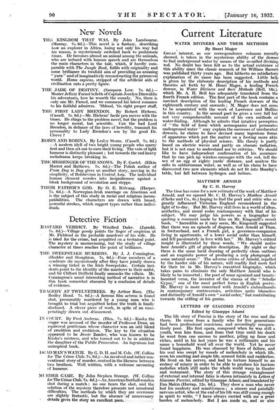MATTHEW ARNOLD By C. H. Harvey
The time has come for a new estimate of the work of Matthew Arnold, and we opened Mr. C. H. Harvey's Matthew Arnold (Clarke and Co. 6s.) hoping to find the poet and critic who so greatly, influenced Victorian England reconsidered in the light of to-day. But Mr. Harvey still lives in a world of ideas, aesthetics, and moral codes contemporary with that of his subject. We may judge his powers as a biographer by- quoting a comment made by him on Mr. Kingamill's recent
book. Incredible as it may seem, Mr. Kingsmill suggested that there was an episode of disgrace, that Arnold at Thun, in Switzerland, met a French girl, a governess-companion living in apartments, of a lower social order than himself, and fell passionately in love with her." Mr. Harvey's critical insight is illustrated by these words, " We should notice here Arnold's gift of graphic description. By night or day there is the same lucid drawing of perfectly clean outlines and an exquisite power of producing a very photograph of some natural scene." The adverse critics of Arnold, repelled by the harder side of his nature, will readily find more fuel for their ire in Mr. Harvey's cravatted biography, which takes pains to eliminate the only Matthew Arnold who is likely to be immortal ; the poet of some agonized and beauty- haunted verse, the inventor of the stanza of the " Scholar Gypsy," one of the most perfect forms in English poetry. Mr. Harvey is more concerned with Arnold's embroilments in contemporary controversies, activities quite blameless and distinctly of Arnold's own " social order," but contributing towards the stifling of his genius.


































 Previous page
Previous page